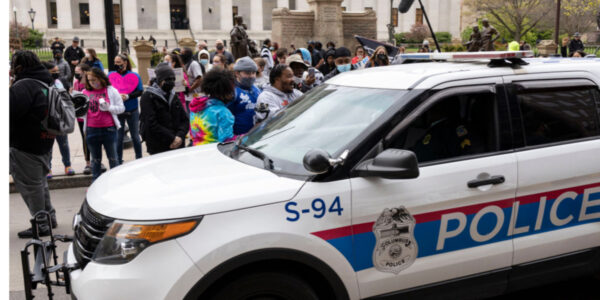Columbus to Pay $440K to Injured Man Cop Slammed to the Ground for Traffic Citation, Reopening His Wounds After Surgery
Columbus, Ohio, has reached a deal to pay a settlement to a Black man violently arrested in 2018 for an unpaid traffic ticket.
Attorneys for the city and Cameryn Standifer made the agreement as a jury deliberated the outcome of a federal civil trial in late November. Standifer’s lawyers said that when Columbus Police officer Brandon Harmon slammed him, it exacerbated their client’s injuries from a car accident three months before, the Columbus Dispatch reports.
“On behalf of our client, we are extremely pleased with the outcome of settlement negotiations,” Attorney Jessica Olsheski said. “This will improve Cameryn’s opportunities for success in his life going forward.”
Standifer filed the suit against Harmon in September 2019. He initially also named the city, four other CPD officers, Franklin County, where Columbus is located, and three workers inside the Franklin County jail. By the time of the 2022 trial, the other defendants were removed from the suit.
Standifer’s team initially asked the court to reimburse him for his medical bills totaling over $1 million and for compensation for his suffering, but eventually settled with the city on Nov. 18 for a much smaller amount while the federal jury was on the second day of deliberations.
The settlement award will compensate Standifer for the new injuries and the emotional pain and distress he sustained during the arrest. The man will not be compensated for an infection he was diagnosed with days after being released from jail.
Standifer was arrested on Aug. 1, 2018, at a home on the far east side of town. Police received multiple complaints about illegal activity and entered the residence with the permission of the owner. While there, the police took the identification of all the people inside the home.
According to court documents, after Harmon ran a warrant check he realized Standifer had an active warrant for an unpaid traffic ticket, which gave him grounds to arrest him.
Police bodycam video shows the arrest, including Harmon instructing Standifer to get up from the couch and put his hands behind his back. Standifer compiles but within seconds, Harmon alleges he is being resistant.
According to a use-of-force report, the officer said the suspect tightened up both his arms.
“Don’t tense up,” Harmon says in the body-camera video.
“I am not tensing up, dude,” Standifer replies.
“Relax! Relax!” Harmon says.
Harmon then flings Standifer, who was already injured from a car crash on May 17, 2018, down to the floor. The incident was captured on another officer’s camera. About six other people sat around in the living room as Harmon manhandled the Black man.
Standifer’s legal team said the altercation was violent and opened back up their client’s leg wound and further injured his right arm. The arm injury reopened a wound close to his elbow.
“He just had surgery,” one woman in the room during the arrest says to Harmon.
Attorneys shared during the trial their client went to the OhioHealth Grant Medical Center several days after being released from jail, where he was diagnosed with a MRSA infection, hospitalized for nearly a month, and underwent multiple procedures. Medical bills from those operations exceeded $1.2 million, the attorneys said.
Over the years, the defense argued that Standifer was a drug addict and wanted to include his “alleged intravenous drug use” and “his criminal history and alleged violent tendencies” as evidence. But Standifer’s team argued against that, according to court records.
Standifer’s lawyers said “any references in his medical records to intravenous drug use should be redacted because the physicians did not know he received IV drugs because of his May 2018 car crash. Instead, the doctors assumed he used illegal IV drugs when they documented their observations in medical records.”
The attorneys also argued the defendant should not be able to use allegations of any “violent tendencies” because, at the time of the incident, all he knew about was an outstanding traffic ticket.
In February, the court ruled the defense could use Standifer’s outstanding warrants and previous felonies as evidence because they spoke to his character.
The court ruled, “Plaintiff’s three felony convictions, in 2018, 2019, and 2021 are admissible to impeach his credibility because the probative value for impeachment purposes is not “substantially outweighed” by the prejudicial effect.”
This further complicated the case for Standifer, making the settlement easier for his team to accept. Standifer is now on the hook for the fees he incurred while receiving care.
Harmon was defended by Columbus City Attorney Zach Klein’s office, which has not commented on the case.

